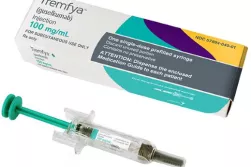CHARLOTTE, NC — Premier, Inc. announced a strategic partnership with AstraZeneca called Uncover CKD - Care Collective aiming to identify patients with undiagnosed clinical chronic kidney disease (CKD); raise awareness of undiagnosed CKD among healthcare providers; and inform U.S. health systems that want to improve or develop and implement their strategies for CKD diagnosis, treatment and management.
In the U.S., more than 37 million adults have CKD, and the prevalence is rising. Of these adult patients, 90 percent do not know they have CKD. Total inflation-adjusted Medicare expenditures for patients with end-stage renal disease increased to $53 billion in 2019. Among CKD patients, the cost of preventable hospitalizations is $79 million.
Through collaborative initiatives and scalable solutions from across the Premier enterprise, including its PINC AI™ technology and services platform, the Uncover CKD - Care Collective is addressing undiagnosed and rising CKD and the resulting economic burden to the U.S. healthcare system. The partnership with AstraZeneca demonstrates a commitment to implement and learn about innovative approaches to driving optimization of guideline-directed medical therapy for patients.
“We’re thrilled to be working with AstraZeneca and Premier member health systems to help solve the myriad challenges CKD presents to patients and our healthcare system,” said Leigh Anderson, Chief Operating Officer, Premier. “The Uncover CKD - Care Collective initiative highlights the impact collaborative partnerships across life sciences organizations and health systems – coupled with actionable real-world data (RWD), artificial intelligence (AI)-powered clinical and operational solutions, and best-practice consulting and collaboratives – can have in improving the care and cost of treating chronic diseases. As our collective work moves the needle on the rate of CKD diagnosis, those patients previously undiagnosed can begin to be treated and their conditions managed, limiting down-the-line costs associated with more severe disease stages.”
The Uncover CKD - Care Collective is poised to make significant strides in improving CKD diagnosis and advancing patient care through the utilization of:
- PINC AI™ Applied Sciences (PAS) RWD leveraging the PINC AI™ Healthcare Database, laboratory data and technology to identify high-volume areas of unidentified, at-risk patients; screen undiagnosed CKD patients, estimate prevalence and report hospital-specific patient counts; and describe patient characteristics and the clinical and economic outcomes of undiagnosed CKD. This discovery phase work has been completed and findings disseminated to characterize the burden of CKD across the health systems, prioritize and focus hospital-level initiatives, and commit to sustainable organizational change.
- PAS Improvement Science’s Health System Awareness Package, including provider and patient education, provider resources and workflow processes as well as support for participating health systems through provider engagement – all created to be scaled broadly across Premier’s health system network.
- PINC AI™ Stanson AI-powered technology, including clinical decision support and real-time alerts integrated into the provider workflow, to help strategically modify provider behavior to improve CKD screening, diagnosis and care quality.
- PINC AI™ Advisory Services to actively engage physicians, foster mutual accountability and drive clinical transformation and quality improvement efforts around CKD diagnosis, treatment and management throughout the health systems.
- Premier Pharmacy and Group Purchasing Organization resources to optimize medication management protocols and streamline operational processes for enhanced efficiency and positive patient outcomes.
- PINC AI™ Population Health Management Collaborative, including member Accountable Care Organizations (ACOs) and those on the transformation to value-based care, to facilitate idea exchange and best practice sharing.
- Health system collaboration to share project outcomes, publish a white paper, develop a poster presentation for the National Kidney Foundation and present findings at Premier’s 2024 Breakthroughs Conference & Exhibition.
“Through commitment to AstraZeneca’s medical missions of putting patients first and following the science, the Uncover CKD program is applying RWD to create urgency to diagnose and treat patients with CKD. With this innovative partnership we are leveraging relationships with health systems to improve care for 2.8 million patients identified to benefit from earlier CKD diagnosis and treatment,” said Rachele Berria, Vice President and Medical Head, US BioPharmaceuticals, AstraZeneca.
Health System Selection Criteria
In the selection of target health systems for the Uncover CKD - Care Collective, the project team considered disease burden, patient composition (e.g., age, sex, race, ethnicity), payer composition (e.g., Medicaid, Medicare, uninsured), hospital region (geographic diversity), urbanicity of served population, teaching status and hospital size. Priority was given to health systems serving many socially disadvantaged patients (i.e., health equity). For patient outreach efforts, the project team provided screening algorithms to the target sites so that they can identify socially disadvantaged patients with undiagnosed CKD for targeted outreach.
Hospitals and health systems in the U.S. can request access to the online PINC AI™ Community “Chronic Kidney Disease (CKD): Diagnosis and Mgmt.” to obtain outreach materials that have been developed as part of the Uncover CKD Project such as educational resources and tools for patients and healthcare professionals. Premier will work with respective hospitals or health systems to provide relevant resources, based on needs.



